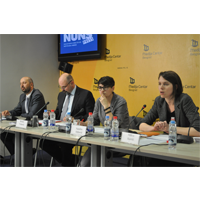The Model Strategy for the Prosecution of War Crimes Presented
 On April 23rd 2015 the Humanitarian Law Center (HLC) presented the Model Strategy for the Prosecution of War Crimes Committed during and in relation to the Armed Conflicts in the Former Yugoslavia (Model Strategy).
On April 23rd 2015 the Humanitarian Law Center (HLC) presented the Model Strategy for the Prosecution of War Crimes Committed during and in relation to the Armed Conflicts in the Former Yugoslavia (Model Strategy).
According to Sandra Orlović, the Executive Director of the HLC, the objective of the Model Strategy is to provide a contribution to the creation of an official state strategy for the prosecution of war crimes in Serbia. The Model Strategy is based on the HLC’s research into the efficiency of the institutions specialised in the prosecution of war crimes in Serbia, the problems that have ensued during the first decade of their work, and the recommendations from the expert consultation meetings regarding the elements of the Model Strategy, as well as of similar strategies in Bosnia and Herzegovina and Croatia. According to Ms. Orlović, the adoption of a national strategy for the prosecution of war crimes is particularly necessitated by the need to resolve numerous problems that have for years now burdened the process of prosecution before the courts in Serbia and for whose resolution a strategic approach is necessary. One of the key problems in this regard is the small number of trials and convicted perpetrators: to date, only 175 persons have been charged with committing war crimes, of which only 68 received the final judgment of conviction. Therefore, the main objective of the Model Strategy is combating impunity for war crimes through the elimination of shortcomings in the legal and institutional framework, and providing the conditions for a strong intensification of war crimes prosecution.
The core of the Model Strategy are activities aimed at increasing the efficiency of the Office of the War Crimes Prosecutor (OWCP) and of the War Crimes Investigation Service. The Model Strategy proposes the adoption of a special prosecutorial strategy, with the aims of setting up basic records (record-keeping system) for pending cases and of prioritizing cases. Depending on the severity of the consequences, the role of the indicted individuals in the military, police and civilian hierarchies, the availability and quality of the evidence, and the unscrupulousness in the commission of the crimes, cases will be categorised into those of the first, second and third categories. According to this Model, the aim of the prosecutorial strategy is to prosecute all cases of the first category and half the cases of the second category by the end of 2025.
Milica Kostić, the HLC Legal Director, presented the activities envisaged in the Model Strategy in the fields of protection and support for victims and witnesses, and presentation of trials in public. The Model Strategy proposes that the procedural protection of witnesses be improved by, among other things, the issuing of formal warnings and penalties for insulting witnesses, the continuous training of defense attorneys for working with victims and the adoption of special measures to protect the victims of sexual violence. The measures of the Model Strategy for the improvement of non-procedural protection of witnesses include the introduction of a system of investigating complaints about the work of the Witness Protection Unit, the transfer of this Unit from the jurisdiction of the Ministry of the Interior to the jurisdiction of the Ministry of Justice, strengthening supervision over the implementation of the Witness Protection Programme and prohibition of the employment in the Witness Protection Unit of former members of the units which committed crimes.
In order to provide adequate support to victims and witnesses of war crimes, the Model Strategy envisages strengthening the role of the Service for Assistance and Support to Victims and Witnesses, the signing of a regional agreement on cooperation in providing assistance to victims and witnesses who have to go to another country to testify, the mapping of NGOs and institutions that provide assistance and support to victims and witnesses and the establishment of a sustainable system of financial support for these organizations, and finally, training for working with victims for everyone who comes into contact with them. Since the presentation of trials to the public is largely neglected, most citizens cannot identify even one case on trial before the domestic courts. The Model Strategy proposes the establishment of a public relations department in the war crimes departments of the Higher Court and the Court of Appeal in Belgrade, the adoption of a single rulebook on the anonymisation of judgments and enabling the recording of trials.
Bruno Vekarić, Deputy War Crimes Prosecutor, assessed that the adoption of a national strategy has more importance in terms of resolving the legacy of the past rather than just being one of the requirements in the context of the EU integration of Serbia. He informed the attendees that the Serbian Ministry of Justice has formed a working group to develop a national strategy for prosecuting war crimes and that the special prosecutorial strategy is in the draft stage. Vekarić pointed out a few things that are essential for an effective prosecution of war crimes. First, strengthening the capacity of the OWCP, the War Crimes Investigation Service and the Witness Protection Unit. Previous assessments of the efficiency of OWCP work should be regarded from this point of view, especially regarding the prosecution of high-ranking perpetrators. He concluded that it is impossible to prosecute war crimes if there are not sufficient financial, human and technical capacities. Second, improvement of cooperation with domestic and international institutions, NGOs and the media. Third, adequate support and protection of witnesses and victims of war crimes. He emphasized that the witnesses in cases of war crimes are very important, but that they are also difficult to get to, especially in the atmosphere of the cover-up of crimes and the conspiracy of silence. Finally, an effective regional cooperation with the judicial institutions in the countries of the region is essential for the prosecution of war crimes which happened across the border.
Ivan Jovanović, an expert in international humanitarian law, argued that a national strategy for prosecuting war crimes is necessary because trials for war crimes as a necessity, task and challenge will confront Serbia for many years to come. War crimes do not have a statute of limitations and Serbia is bound by both domestic and international law to prosecute them. In addition, trials in Serbia are burdened by numerous problems whose resolution requires a systematic approach. In the end, what is necessary in this field is a government umbrella policy in order to connect and coordinate all participants and elements for prosecuting war crimes. Jovanović also emphasized that, for a society with experience of armed conflict, it is desirable to have a wider strategy – a transitional justice strategy – which, besides the establishment of criminal justice for the crimes committed, would also provide for reparations to victims, adapted educational programmes, truth-seeking and truth-telling mechanisms, programmes of public commemorations and other measures.
Vesna Nikolić Ristanović, a representative of the Victimology Association of Serbia and the Victim Support Europe, emphasized that the Model Strategy provides for protection and support to victims that are in accordance with international and European standards. She stated that that is important primarily for the citizens of Serbia, because with the adoption of these standards the victims can receive the necessary assistance and support. Dragan Pjevač, President of the Coordination of Serbian Associations of Families of Missing and Murdered Persons in the Former Yugoslavia, said that it is very important for the Serbian judiciary and the victims to prosecute war crimes committed against members of other nationalities, because a responsible attitude towards war crimes gives credibility in relationships with other nations. Therefore, he supports the adoption of a national strategy which will improve the prosecution of war crimes before courts in Serbia.
The Model Strategy for the Prosecution of War Crimes Committed during and in relation to the Armed Conflicts in the Former Yugoslavia is also available here.








